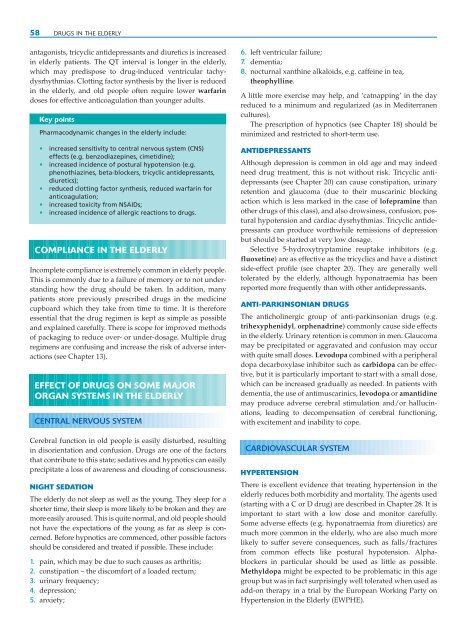A-Textbook-of-Clinical-Pharmacology-and-Therapeutics-5th-edition
A-Textbook-of-Clinical-Pharmacology-and-Therapeutics-5th-edition
A-Textbook-of-Clinical-Pharmacology-and-Therapeutics-5th-edition
You also want an ePaper? Increase the reach of your titles
YUMPU automatically turns print PDFs into web optimized ePapers that Google loves.
58 DRUGS IN THE ELDERLY<br />
antagonists, tricyclic antidepressants <strong>and</strong> diuretics is increased<br />
in elderly patients. The QT interval is longer in the elderly,<br />
which may predispose to drug-induced ventricular tachydysrhythmias.<br />
Clotting factor synthesis by the liver is reduced<br />
in the elderly, <strong>and</strong> old people <strong>of</strong>ten require lower warfarin<br />
doses for effective anticoagulation than younger adults.<br />
Key points<br />
Pharmacodynamic changes in the elderly include:<br />
• increased sensitivity to central nervous system (CNS)<br />
effects (e.g. benzodiazepines, cimetidine);<br />
• increased incidence <strong>of</strong> postural hypotension (e.g.<br />
phenothiazines, beta-blockers, tricyclic antidepressants,<br />
diuretics);<br />
• reduced clotting factor synthesis, reduced warfarin for<br />
anticoagulation;<br />
• increased toxicity from NSAIDs;<br />
• increased incidence <strong>of</strong> allergic reactions to drugs.<br />
COMPLIANCE IN THE ELDERLY<br />
Incomplete compliance is extremely common in elderly people.<br />
This is commonly due to a failure <strong>of</strong> memory or to not underst<strong>and</strong>ing<br />
how the drug should be taken. In addition, many<br />
patients store previously prescribed drugs in the medicine<br />
cupboard which they take from time to time. It is therefore<br />
essential that the drug regimen is kept as simple as possible<br />
<strong>and</strong> explained carefully. There is scope for improved methods<br />
<strong>of</strong> packaging to reduce over- or under-dosage. Multiple drug<br />
regimens are confusing <strong>and</strong> increase the risk <strong>of</strong> adverse interactions<br />
(see Chapter 13).<br />
EFFECT OF DRUGS ON SOME MAJOR<br />
ORGAN SYSTEMS IN THE ELDERLY<br />
CENTRAL NERVOUS SYSTEM<br />
Cerebral function in old people is easily disturbed, resulting<br />
in disorientation <strong>and</strong> confusion. Drugs are one <strong>of</strong> the factors<br />
that contribute to this state; sedatives <strong>and</strong> hypnotics can easily<br />
precipitate a loss <strong>of</strong> awareness <strong>and</strong> clouding <strong>of</strong> consciousness.<br />
NIGHT SEDATION<br />
The elderly do not sleep as well as the young. They sleep for a<br />
shorter time, their sleep is more likely to be broken <strong>and</strong> they are<br />
more easily aroused. This is quite normal, <strong>and</strong> old people should<br />
not have the expectations <strong>of</strong> the young as far as sleep is concerned.<br />
Before hypnotics are commenced, other possible factors<br />
should be considered <strong>and</strong> treated if possible. These include:<br />
1. pain, which may be due to such causes as arthritis;<br />
2. constipation – the discomfort <strong>of</strong> a loaded rectum;<br />
3. urinary frequency;<br />
4. depression;<br />
5. anxiety;<br />
6. left ventricular failure;<br />
7. dementia;<br />
8. nocturnal xanthine alkaloids, e.g. caffeine in tea,<br />
theophylline.<br />
A little more exercise may help, <strong>and</strong> ‘catnapping’ in the day<br />
reduced to a minimum <strong>and</strong> regularized (as in Mediterranen<br />
cultures).<br />
The prescription <strong>of</strong> hypnotics (see Chapter 18) should be<br />
minimized <strong>and</strong> restricted to short-term use.<br />
ANTIDEPRESSANTS<br />
Although depression is common in old age <strong>and</strong> may indeed<br />
need drug treatment, this is not without risk. Tricyclic antidepressants<br />
(see Chapter 20) can cause constipation, urinary<br />
retention <strong>and</strong> glaucoma (due to their muscarinic blocking<br />
action which is less marked in the case <strong>of</strong> l<strong>of</strong>epramine than<br />
other drugs <strong>of</strong> this class), <strong>and</strong> also drowsiness, confusion, postural<br />
hypotension <strong>and</strong> cardiac dysrhythmias. Tricyclic antidepressants<br />
can produce worthwhile remissions <strong>of</strong> depression<br />
but should be started at very low dosage.<br />
Selective 5-hydroxytryptamine reuptake inhibitors (e.g.<br />
fluoxetine) are as effective as the tricyclics <strong>and</strong> have a distinct<br />
side-effect pr<strong>of</strong>ile (see chapter 20). They are generally well<br />
tolerated by the elderly, although hyponatraemia has been<br />
reported more frequently than with other antidepressants.<br />
ANTI-PARKINSONIAN DRUGS<br />
The anticholinergic group <strong>of</strong> anti-parkinsonian drugs (e.g.<br />
trihexyphenidyl, orphenadrine) commonly cause side effects<br />
in the elderly. Urinary retention is common in men. Glaucoma<br />
may be precipitated or aggravated <strong>and</strong> confusion may occur<br />
with quite small doses. Levodopa combined with a peripheral<br />
dopa decarboxylase inhibitor such as carbidopa can be effective,<br />
but it is particularly important to start with a small dose,<br />
which can be increased gradually as needed. In patients with<br />
dementia, the use <strong>of</strong> antimuscarinics, levodopa or amantidine<br />
may produce adverse cerebral stimulation <strong>and</strong>/or hallucinations,<br />
leading to decompensation <strong>of</strong> cerebral functioning,<br />
with excitement <strong>and</strong> inability to cope.<br />
CARDIOVASCULAR SYSTEM<br />
HYPERTENSION<br />
There is excellent evidence that treating hypertension in the<br />
elderly reduces both morbidity <strong>and</strong> mortality. The agents used<br />
(starting with a C or D drug) are described in Chapter 28. It is<br />
important to start with a low dose <strong>and</strong> monitor carefully.<br />
Some adverse effects (e.g. hyponatraemia from diuretics) are<br />
much more common in the elderly, who are also much more<br />
likely to suffer severe consequences, such as falls/fractures<br />
from common effects like postural hypotension. Alphablockers<br />
in particular should be used as little as possible.<br />
Methyldopa might be expected to be problematic in this age<br />
group but was in fact surprisingly well tolerated when used as<br />
add-on therapy in a trial by the European Working Party on<br />
Hypertension in the Elderly (EWPHE).


